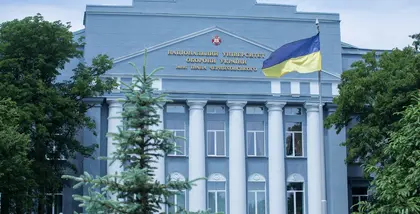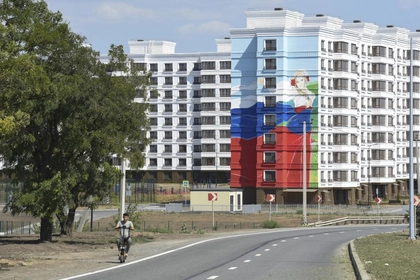Ukraine’s Ministry for Defense is considering how Ukrainian LGBTQ servicemen and women would register their partnerships and have equal rights in the event of injury or death, while draft laws for same-sex relationships are moving through the country’s parliamentary and executive branches.
In response to questions from Kyiv Post, Konstantin Zhura, a spokesman for the Ministry, confirmed the development in the military, which appears part of preparations for new rules for the registration of civil partnerships.
- Read the most current war in ukraine update from the Kyiv Post's daily news updates today.
- Look at the most up-to-date Ukraine news that came out today.
JOIN US ON TELEGRAM
Follow our coverage of the war on the @Kyivpost_official.
Currently, if a LGBTQ person serving in Ukraine’s military were to be a casualty during its defense against Russia’s full-scale invasion, their partner has: a) no right to be consulted about their medical care or funeral arrangements; b) no enshrined inheritance rights, and; c) no right to compensation eligibility. This contrasts with heterosexual partnerships.
To address this situation, it has emerged, during the week of the International Day of Against Homophobia, Biphobia and Transphobia (IDAHOBAT), that there are presently two simultaneous but separate legislative initiatives on the issue. One is from the parliamentary branch of government and the other from its executive or Ministerial branch.
The first is a draft bill initiated in March 2023 by Inna Sovsun, an elected member of the Verkhovna Rada, Ukraine’s national parliament.

Ukraine’s Usyk Beats Fury in Heavyweight Championship Rematch
Sovsun is from the opposition Holos Party; the parliamentary majority is held by the Servant of the People Party of President Volodymyr Zelensky. Her bill has 18 co-signatories from across party lines.
The other, as outlined by Zhura to Kyiv Post, is being prepared by the Ministry for Justice for the consideration of Ukraine’s Cabinet of Ministers.
Sovsun’s draft bill No. 9103 is in circulation for debate and consideration through Ukraine’s parliamentary committee system.
In the last week, two parliamentary committees – one for European integration and one for digital transformation - both unanimously voted in favor of Sovsun’s draft bill.
There are eleven other committees that may debate it before it comes to the floor of the full Rada. The draft bill also has the support of and was developed in consultation with independent which LGBT stakeholders.
The Government’s bill claims to be wider in scope, but details are not available yet.
“This draft law is intended to regulate the issue of civic partnership in a broader sense than in previously proposed legislative initiatives,” Zhura said. “It is about introducing a similar institution for wider categories of citizens, i.e., the possibility to register a civil partnership not only in the context of the family,” he added. Leading LGBT advocate Andrii Kravchuk of the LGBT ‘Nash Svit’ Center has seen the government’s draft bill and said that it is “similar” to the Sovsun initiative. In terms of why there are two similar bills in seeming competition, Kravchuk suggests that it is about political optics. “Ukraine’s authorities are definitely motivated by the need to look like a modern liberal state in front of their Western partners much more than they are by the need to protect human rights of their own citizens,” Kravchuk said.
“Such a situation is rather typical for transitional democracies, particularly EU candidate states.”
“In addition, the ruling party (in fact, Zelensky’s team) try to totally control the legislative process and get all credit on their own account blocking similar moves from the pro-European… opposition,” he said.
However, Kravchuk also credits Zelensky’s government for fulfilling promises made in the 2021 Action Plan for Human Rights – “unlike the previous ones.” The Action Plan stipulates that the civil partnerships registration law needs to be introduced to the Rada by December 2023.
“The Action Plan is a document developed and adopted by the Ukrainian government - the Cabinet of Ministers of Ukraine – and therefore only governmental agencies are responsible for its implementation. If the government doesn’t develop the relevant draft law, it fails to fulfil the corresponding provision of the Action Plan,” Kravchuk said.
The legislative path forward remains somewhat unclear. Sovsun has previously not committed to a timetable for her draft bill, citing the need to build more support and consensus in the Verkhovna Rada.
“The governmental bill can be introduced only after the Rada considers Sovsun's proposal or according to a special procedure as ad hoc,” Kravchuk said.
On the IDAHOBAT, Sovsun called for further government action on her Facebook page.
“We call on the government of Ukraine to secure legal rights for official recognition of civil partnerships. It’s especially important that the partners of LGBTQI+ soldiers who have been injured or killed during combat have the rights to visit hospitals, make decisions about [their partner’s] medical care or burial, and receive government compensation,” she said.
Kyiv Post also asked the Ministry for Defense if a previously mooted meeting between Minister of Defense Oleksii Reznikov and LGBT servicepeople was going ahead. No comment was provided in return by Zhura.
Kravchuk believes this means there will be no meeting, due to the Ministry’s “conservative views.” But, other senior stakeholders of the LGBT community, including parliamentarians, who spoke to Kyiv Post maintain optimism that the meeting will soon take place.
In the statement released to Kyiv Post, the Ministry said that it “respects and observes human rights enshrined in the Constitution, adheres to the principles of respect, equality and non-discrimination for all social groups and creates conditions designed to prevent restrictions based on race, skin color, political, religious and other beliefs, gender, ethnic and social origin, property status, place of residence, on linguistic or other grounds.”
You can also highlight the text and press Ctrl + Enter






